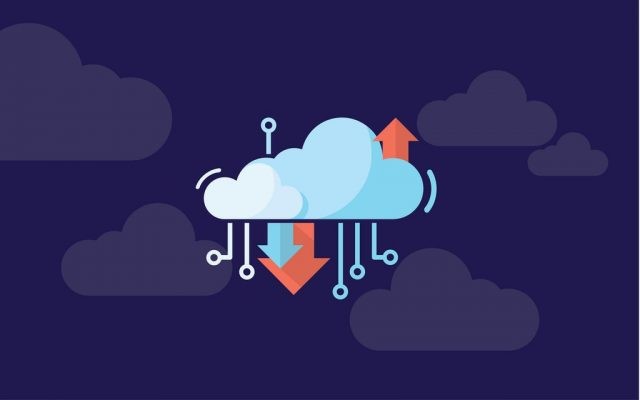Cloud computing provides the convenience small business owners need. It saves time and money, improves collaboration, and boosts productivity.
In today’s dynamic business climate, it’s all-important that people get the information they need wherever they happen to be, whether they’re in the office or out and about with their cellular phone. Information travels fast nowadays, but how does it work? And, how safe is cloud computing security?
What is ‘The Cloud’?
The Cloud is a term that is commonly used to represent the Internet. It describes a global network of servers which are linked together and operate as an ecosystem. These servers store and manage data, run applications (apps), or deliver streaming videos (YouTube), web mail (Gmail), office productivity software (Office 365), or social media (Facebook, Twitter). Cloud computing syncs data for all connected devices, which keeps them updated with real-time information.
Within the scope of cloud computing there are specific services, including:
• Cloud storage – store, backup, share and sync your files across devices
• Cloud backup – backup source in the event of data loss, such as a crash or a cyber attack
• Software as a service (SaaS) – third-party provider hosts applications and uses the web to provide a service, such as Office 365
• Cloud hosting – facilitates all types of information sharing, such as email services, data storage, application hosting, web-based hosted phone systems (VoIP)
Information Security
Financially, it doesn’t make sense for small to medium businesses to run their own servers or data centre, especially since most businesses fail to spend enough to get the high quality and secure system they need. Most victims of major data breaches are companies with their own internal servers and outdated systems.
Nowadays, as long as passwords are strong, the security of cloud stored data is better. Since it is stored away from your premises, it’s much less likely that you’ll lose it in the event of a natural disaster, like a fire or flood.
To truly secure an account, cloud computing users should use two-factor authentication (2FA) which is designed to ensure that you’re the only person who can access your account, even if someone knows your password. You confirm your identity by presenting two or more pieces of evidence (or factors) to an authentication mechanism. The first factor can be something you know (password) and a second factor can be something you have or something you are. For example, a trusted phone number can be used to receive verification codes by text message or automated phone call. Or, a temporary verification code can be sent to your trusted device or phone number when you sign in to a new device or browser.
Hosted Cloud Options
There are three types of hosted cloud solutions: public, private and hybrids. Because companies have differing needs, a quality IT Managed Services Provider will provide all types of hosted cloud deployments. They act as your ambassador to suppliers, and keep your company’s IT infrastructure up-to-date and running smoothly.
1) Public Cloud
This is the most common way of deploying cloud computing. The cloud resources are on an external platform owned and operated by a third-party cloud service provider, such as Microsoft Azure.
Users share the same hardware, storage, and network devices with other cloud “tenants”. You manage your account and access services using a web browser. Those services, such as Microsoft Office 365, include web-based email and online office applications, as well as file sharing and storage.
2) Private Cloud
A private cloud consists of computing resources used exclusively by one organization that is either hosted by a third-party service provider or physically located at an office’s on-site datacenter.
All hardware and software are dedicated to that organization. As well, all services and infrastructure are maintained on a private network which makes it easier for the organization to meet specific IT requirements by customizing its resources.
This option is most often used by organizations with business-critical operations who seek control over their environment.
3) Hybrid Cloud
The hybrid cloud is often called “the best of both worlds,” as it combines private clouds with public clouds, so that organizations can have the advantages of both.
This makes for better flexibility and more deployment options as data and applications can move between private and public clouds.
For example, the public cloud could be used lower security yet high-volume needs such as web-based email, and the private cloud for sensitive, critical business operations like financial reporting.
Many organizations “cloud burst”, when an application or resource runs on a private cloud until there is a spike in demand (such as Black Friday online shopping or tax filing season), at which point the organization can “burst through” to the public cloud to use more computing resources.
Compliance and Security Standards
Reputable IT companies partner with the right vendors and implement technology that focuses on identity verification and data encryption. At WW Works, our preferred comprehensive cloud management platforms lead the industry with certifications.
VMware and Microsoft have clear cloud computing security and privacy requirements. There are clear standards, processes and procedures designed to provide information security assurance. They identify risks in real-time to reduce exposure and lower repair costs. They also provide continuous, real-time scanning and alerting of “out-of-compliance” events.
Microsoft Azure meets a broad set of international and industry-specific compliance standards, such as Europe’s new General Data Protection Regulation (GDPR).
The Bottom Dollar
For most businesses, it makes financial and safety sense to outsource information technology needs to a fixed-fee IT Managed Services Provider. In addition to predictable pricing and manageable costs, a reputable MSP improves the efficiency and dependability of their clients IT operations with services such as network solutions, cloud computing security, regulatory support and a 24/7/365 Help Desk.






